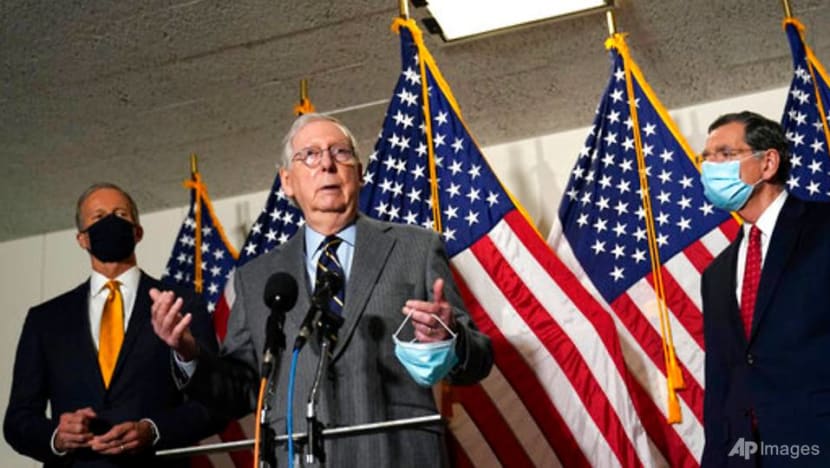commentary Commentary
Commentary: Impeaching Donald Trump still makes little sense
Winning that battle will not resolve the longstanding problems faced by both Democrats and Republicans, says Yale-NUS’ Chris Howell.

FILE PHOTO: U.S. President Donald Trump addresses a campaign rally in Dalton, Georgia, U.S., on the eve of the run-off election to decide both of Georgia's Senate seats January 4, 2021. REUTERS/Leah Millis/File Photo
SINGAPORE: Observers of American politics can be forgiven for wondering why Washington is gearing up for another impeachment battle given that Donald Trump has already left office.
There are clearly insufficient votes in the Senate to impeach, and the incoming Biden-Harris Administration seems cool to the idea, viewing it as a distraction from the appearance of single-minded focus upon the pandemic and economic crisis that it wishes to project.
There is little doubt that Trump contributed to the storming of the Capitol in January with his words of encouragement and incitation, and one can wish that he be held responsible.
Yet it is more likely that he will be acquitted, and that acquittal will be taken as a win by Republicans and Trump’s supporters.
Censure stands a better chance of passage, and of receiving a fig leaf of bipartisan support from Republicans.
READ: Commentary: Donald Trump must be convicted and disqualified from running in 2024
READ: Commentary: A second impeachment is only the start of Trump’s legal woes
REPUBLICAN PARTY ALSO BEARS RESPONSIBILITY
Moreover, the truly horrifying aspects of the events of Jan 6 are not the role of President Trump but rather the degree of organisation and determination on the part of some participants, and the apparent collusion between them and some Republican members of the Congress.
The harrowing narrative earlier this week from Representative Alexandria Ocasio-Cortez about being hunted during the occupation of the Capitol is far more serious than Trump’s electoral delusions and self-pity.
This deserves to be thoroughly investigated, but an impeachment trial and acquittal that focuses upon Trump alone makes that less likely, not more.

So why go through this given its inevitable outcome?
TRAPPED BY THEIR BASES
The reality is that both American parties are trapped by their own bases, or at least the loudest, most influential components of their bases.
The Democrats spent the 2016 Presidential race and the subsequent four years stoking outrage, fundraising and trying to mobilise turnout within the party’s base, with an almost entirely negative focus on Trump.
That focus has allowed the party to paper over very real differences over policy, but has also made it more dependent on upscale, educated voters for whom Trump is more of a political than an economic threat – and above all, a challenge to democratic norms and politeness – while failing to make inroads into the less affluent, less well-educated, generally white voters that the Democratic Party once won.
The impeachment strategy is a response to the outrage of the first group, not the second.
READ: Commentary: This impeachment is different. Pity it might not go as planned
READ: Commentary: Joe Biden’s economic plan is welcome medicine that bridges divide
The Republican Party, too, has used outrage to mobilise its base, doubling down on white nationalism, conspiracy theories, and voter suppression.
A constant theme of this mobilisation has been grievance: Against coastal elites, cultural elites the media and the Democratic Party’s obsession with Donald Trump.
As long as the Democrats did little to reach out to working class voters, indeed often emphasising the deep roots of racism among such voters, the GOP has been given a free hand to mobilise them.

As a result, it is hardly surprising that after some limited initial criticism of President Trump in the days after the US Capitol storming, the vast majority of elected Republicans have fallen into line with him as impeachment approaches, all but ensuring his acquittal.
WORRYING SIGNS FOR THE FUTURE OF THE GOP
Impeachment and its likely outcome can be explained by the somewhat risky mobilisation strategies of the two parties over the last four years.
The risk for the Republican Party is that it becomes ever more associated in the minds of independent voters with the fringe politics of white grievance, with far-right Representative Marjorie Taylor Greene front and centre rather than moderate Representative Liz Cheney. This would permit a further erosion of support in the affluent suburbs of Atlanta, Austin, and elsewhere in the south.
The narrow victory of the Democrats in both Georgia Senate races, and the gains made by the Biden campaign in Texas, are worrying signs for the future of the GOP.
READ: Commentary: With the Democrats firmly in charge in the US, we can look forward to economic gains
READ: Commentary: Lack of a landslide win in US election is worrying news
This risk for Republicans is mitigated, however, by two factors.
First, despite the catastrophic loss of life during the pandemic, deep recession, and his many personal failings, Donald Trump did remarkably well in the 2020 election, recording both the highest turnout ever for a losing candidate and surprising levels of support among Latino voters and African Americans.
Republican strategists and party leaders can hardly ignore the fact that Trump was not definitely repudiated at the polls and remains a potent force in American politics.
The second is that the Republican Party does not need to govern in the same way that Democrats do.
Republicans have achieved their two key goals. First, of reshaping the judiciary towards greater conservatism, which has now been achieved probably for the next generation, with the appointment of Neil Gorsuch, Brett Kavanaugh and Amy Coney Barrett, and second, in blocking legislation that might roll back tax cuts and corporate power.

On this latter objective, Republican interests will win just by doing nothing to rein in the worst excesses of the gig economy, the financialisation of the economic system and footloose capital.
IMPEACHMENT WILL NOT BRING BACK LOST DEMOCRAT VOTERS
The Democrats, on the other hand, need to govern expansively to create a durable electoral majority.
Impeachment will not help them appeal to working class voters who have abandoned them in recent years.
Those voters feel a powerful sense of a system rigged against them. That grievance is based on several decades of bipartisan neoliberal economic drift that has seen wages stagnate, secure good jobs replaced by precarious ones, the social safety net atrophy and affordable healthcare become out of reach.
READ: Commentary: How to prevent 'Trump 2024' from happening
To win back these voters, and to inoculate them against Trumpism, the Democratic Party needs to address the root causes of this economic crisis. It cannot do so through the spectacle of impeachment and the largely symbolic politics at which it excels.
That is why it is perhaps no surprise that amidst the pomp, celebrity, self-congratulation and careful choreography of the Biden inauguration, the most widely-circulated meme was of Senator Bernie Sanders, defiantly authentic in heavy coat and mittens.
It’s a reminder that the most urgent priority of this new administration is to begin the reconstruction of the American economy on behalf of those left behind in the last three decades.
Listen to Prof Chan Heng Chee and BowerGroupAsia Managing Director James Carouso explain how America came to be so deeply divided amid a bitterly fought election on CNA's Heart of the Matter podcast episode published in November 2020:
Chris Howell is Visiting J Y Pillay Professor at Yale-NUS College and James Monroe Professor of Politics at Oberlin College.














